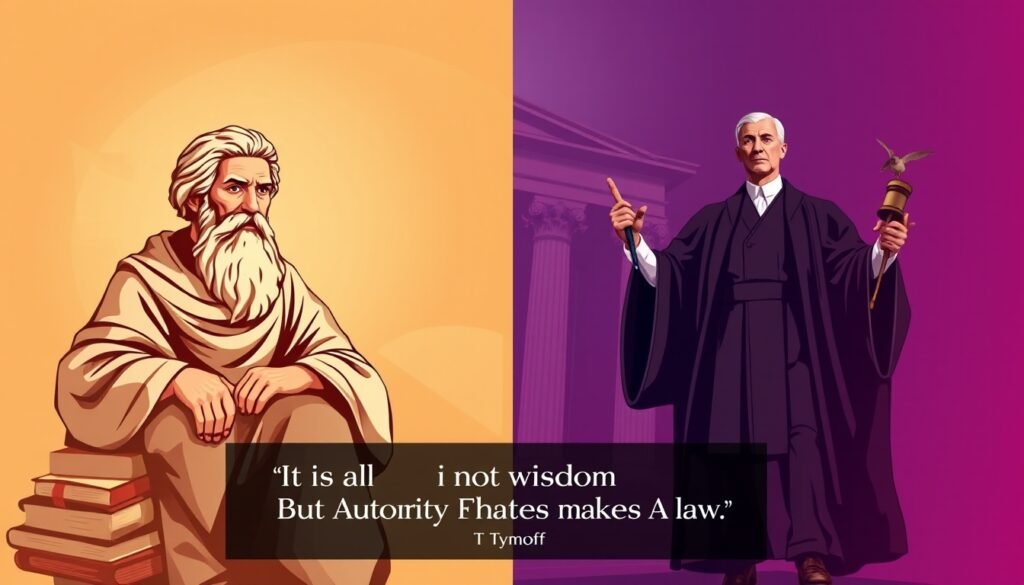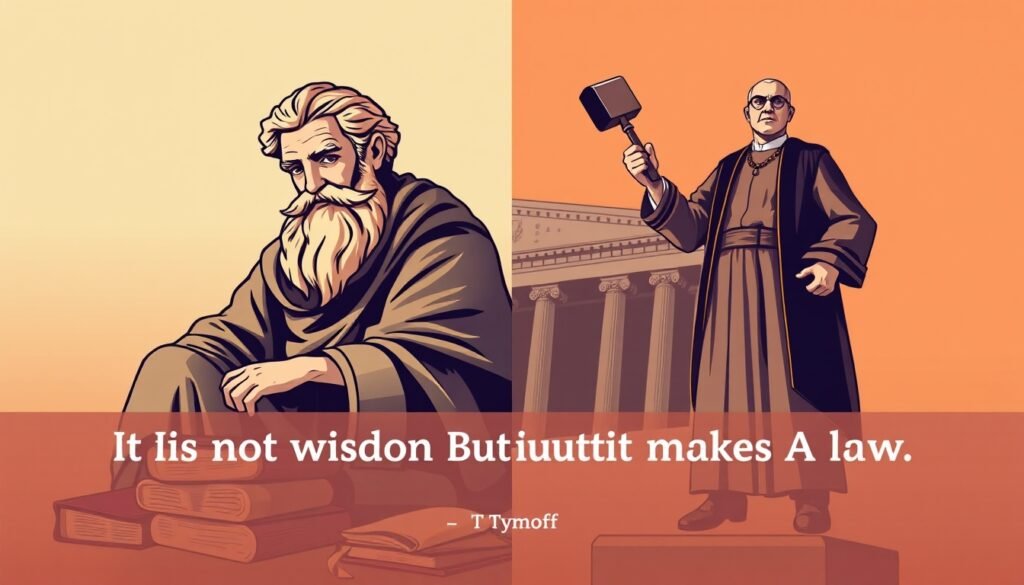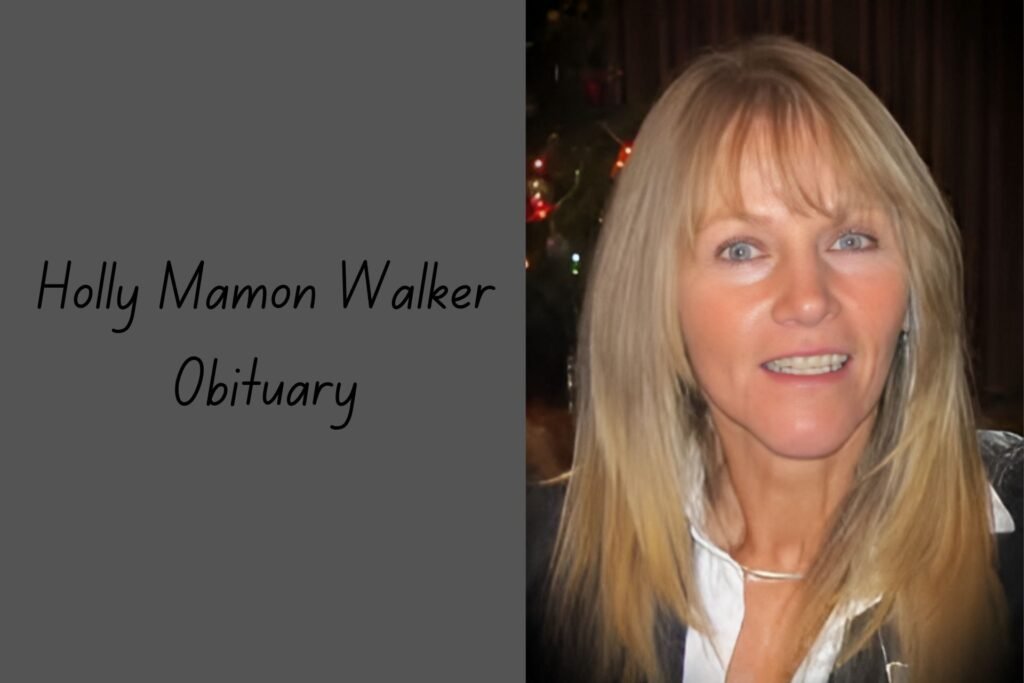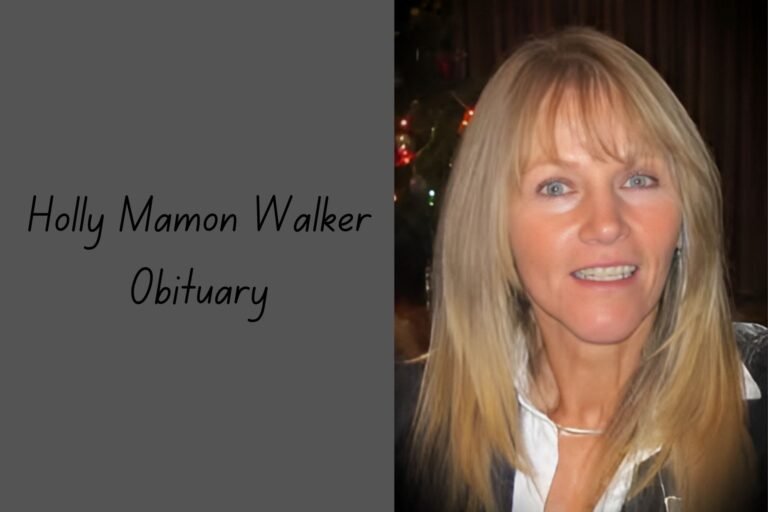In the perplexing embroidery of regulation and administration, the declaration by T. Tymoff — “It Is Not Wisdom But Authority That Makes A Law. t – Tymoff” — fills in as a significant point of convergence for discussion and examination. This article digs into the connection between power and shrewdness in regulation-making, giving a far-reaching outline that stretches out past ordinary conversations, looking at verifiable settings, contemporary ramifications, and the continuous exchange encompassing the idea of lawful power.
Figuring out an Expert in Regulation
Meaning of Power
Expert in regulation alludes to the genuine power held by organizations and people to make, execute, and implement regulations. This power is gotten from different sources, including:
- Legislation: Regulations passed by administering bodies, like parliaments and congresses.
- Legal Decisions: Understandings and decisions by courts that lay out lawful points of reference.
- Regulatory Regulations: Rules made by administrative organizations to uphold legal regulations.
The Job of an Expert in General sets of laws
- Regulation Creation: Authority is crucial in the law-production process. State-run administrations and regulative bodies have the selective right to draft and sanction regulations, which are then upheld by assigned specialists.
- Enforcement: The authorization of regulations depends vigorously on the power vested in policing, like the police and administrative bodies. Their job is vital in keeping everything under control and guaranteeing consistency with lawful norms.
The Interaction Between Power and Insight
Authority Without Insight: A Blade that cuts both ways
While power is fundamental for laying out and implementing regulations, “It Is Not Wisdom But Authority That Makes A Law. t – Tymoff” features a basic concern: the potential for power to make uncalled-for regulations. At the point when regulations are forced without the direction of astuteness or moral contemplations, they can prompt persecution and social agitation.
The Significance of Intelligence
- Moral Framework: Shrewdness gives an ethical compass that guides legislators in making just and evenhanded regulations. It includes figuring out the more extensive cultural ramifications of regulation and integrating moral contemplations into the legitimate system.
- Public Acceptance: Regulations are seen as insightful and simply are bound to acquire public help and authenticity. At the point when Legal Authority acts without shrewdness, it gambles with estranging residents and sabotaging trust in the overall set of laws.
Authentic Viewpoints on Power and Intelligence
Authentic Setting
Over the entire course of time, the strain among power and astuteness has been clear. Different systems have delineated the risks of focusing on power over shrewdness:
- Dictator Regimes: Numerous tyrant legislatures force regulations that serve the interests of the trivial few, frequently ignoring the benefit of everyone. Models incorporate severe systems where regulations are sanctioned to smother disagreement instead of advance equity.
- Philosophical Insights: Logicians like Plato have pushed for an administration model driven by savvy rulers, yet genuine applications much of the time stand out from this ideal. The hole between astuteness and authority has frequently brought about uncalled-for general sets of laws.

Contemporary Applications
Adjusting Authority and Astuteness in Present day Overall sets of laws
In present-day majority rules systems, the test stays to offset authority with shrewdness:
- Participatory Regulation Making: Connecting with residents in the official cycle can upgrade the insight implanted in parents-in-law. Public interviews, master boards, and resident gatherings are instruments that advance participatory administration.
- Checks and Balances: The division of abilities among the administrative, leader, and legal branches is pivotal in forestalling the maltreatment of power. Legal survey fills in as a check against unreasonable regulations, guaranteeing they mirror the qualities and morals of society.
The Job of Moral Contemplations
- Moral Imperative: Moral contemplations should direct regulation-making processes. Overall sets of laws ought to advance to reflect changing cultural standards, values, and aggregate insight.
- Authenticity of Laws: For regulations to be viable, they should be seen as genuine and grounded in moral standards. This authenticity cultivates public trust and consistency.
FAQs
What does the statement “It Is Not Wisdom But Authority That Makes A Law. t – Tymoff” mean?
This statement underlines that regulations are essentially settled through the force of power as opposed to being established in moral insight or moral thinking.
How might insight at any point be coordinated into current regulation-making?
Shrewdness can be coordinated through open cooperation, master meetings, and guaranteeing that regulations mirror the moral guidelines and upsides of society.
What are the dangers of power superseding shrewdness in law?
At the point when authority supersedes shrewdness, it can prompt uncalled-for regulations that serve limited interests, bringing about friendly discontent and possible distress.
How do verifiable models delineate the contention between power and wisdom?
Verifiable models, like dictator systems, show the way that the grouping of forces can prompt harsh regulations that disregard the benefit of all.
What components can forestall the maltreatment of experts in legitimate systems?
Components like governing rules, legal surveys, and dynamic metro commitment are fundamental for forestalling the maltreatment of experts in regulation making.
Conclusion
T. Tymoff’s declaration, “It Is Not Wisdom But Authority That Makes A Law. t – Tymoff”, epitomizes the continuous pressure in overall sets of laws between the ability to uphold regulations and the moral contemplations that ought to direct their creation. While power is vital for keeping everything under control, astuteness is significant for guaranteeing. That regulations are simple, impartial, and intelligent of cultural qualities.
To make viable and real overall sets of laws, an agreeable harmony between power and intelligence is fundamental. By coordinating moral contemplations, advancing public cooperation, and keeping up with governing rules. Social orders can take a stab at legitimate systems that serve the benefit of all and maintain equity.
Source of Inspiration
Investigate the intricacies of regulation-making and the elements of power and insight further. Take part in conversations about legitimate changes, and take part in open discussions. And support regulations that mirror the aggregate insight of society. Together, we can pursue a general set of laws that exemplifies both power and insight, guaranteeing equity for all.











